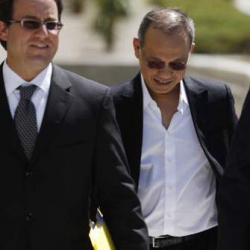U.S. District Judge Andrew Gordon ruled on Firday that the FBI agents who arrested Malaysian high roller Paul Phua violated his civil rights in gathering evidence prior to a raid on his Caesars Palace villa. The FBI pretended to be technicians in order to gain access to Phua’s computers, which violated the 4th Amendment against illegal searches.
The decision by Judge Gordon upheld an earlier recommendation by a federal magistrate judge to toss out evidence in the high-profile case, so a great deal of the evidence against Mr. Phua cannot be used by federal prosecutors. The raid gave the agents from the FBI and the Nevada Gaming Control Board what they needed to obtain an arrest warrant. The investigation revealed that Phua and 6 other men had been operating an illegal World Cup betting ring from three suites at Caesars Palace.
Staff members sent to clean the room had become suspicious when they saw multiple computers and media stations monitoring the World Cup matches. Staff reported tis to management, who called the Gaming Control Board. The original arrests happened in July 2014.
“Great Day for American Citizens and Mr. Phua”
David Chesnoff, one of Phua’s American lawyers, told the Las Vegas Review-Journal, “It’s a great day for American citizens and Mr. Phua in that the rights of privacy and freedom were upheld by the court.”
Chesnoff had joined fellow defense attorneys Richard Schonfeld and Thomas Goldstein in arguing the FBI’s ploy was unconstitutional. In a 22-page decision rendered on Friday, Andrew Gordon agreed.
No Evidence from Raid Can Be Used
The Fourth Amendment states that the people have the right to be free from “unreasonable searches and seizures”. No evidence obtained by the agents can be used against Paul Phua, who is the lone defendant remaining in the case. The other 6 men pleaded guilty months ago, in order to obtain lesser sentences.
Created Subterfuge to Access Premises
Judge Gordon stated that the manufacture of a situation that allowed the entry of agents into Phua’s hotel room was a violation of the 4th Amendment. The agents had the hotel’s ISP provide intermittent service to Phua’s rooms, thus requiring the men to ask for computer technicians to repair the issues, due to the suspicion their computers were faulty. Once inside, the agents got a look at the equipment and confirmed that an illegal sports betting ring was in operation.
Gordon reports said, “This case tests the boundaries of how far the government can go when creating a subterfuge to access a suspect’s premises. Here the government disrupted the Internet service to the defendant’s hotel room in order to generate a repair call.”
The report continued, “Government agents then posed as repairmen to gain access to the defendant’s room and conduct a surreptitious search for evidence of an illegal sports betting operation. By creating the need for a third party to enter the defendant’s premises and then posing as repairmen to gain entry, the government violated the defendant’s Fourth Amendment rights.”
Uncertain Future of Case
It is uncertain whether federal prosecutors will continue to prosecute the case against Paul Phua, given a dearth of evidence to use against him. Given they might not have a great case and are facing first-rate attorneys, the prosecutors might prefer to avoid a lengthy legal battle with the wealthy poker professional. Whether they have the leverage to obtain a plea bargain is uncertain, as well.
The main evidence the prosecution might have at this point is the 6 guilty pleas by Paul Phua’s accomplices. One of those men is Darren Phua, who was the last of the men to plead guilty. The 23-year old Darren Phua was said to have “grown homesick” for Malaysia.
Malaysian Official’s Controversy
Meanwhile, a controversy stemming from the arrests continue back in Malaysia. Home Minister Zahid wrote a letter to the FBI saying Phua was not a member of the 14K Triad, as had been charged, and he had actually performed valuable services for Malaysian national security. This led to charges from opposition figures and media sources in Malaysia that Zahid might have received bribes from Phua, or otherwise had a relationship to the Macau junket operator. Phua is said to be worth $300 million to $400 million, due to several businesses tied to the global gambling industry.

